Around the world with Dr. Sommer Aldulaimi
Inspired by a mentor and her immigrant parents, Sommer Aldulaimi, MD, brings a world view to the College of Medicine – Tucson’s Global and Border Health program.
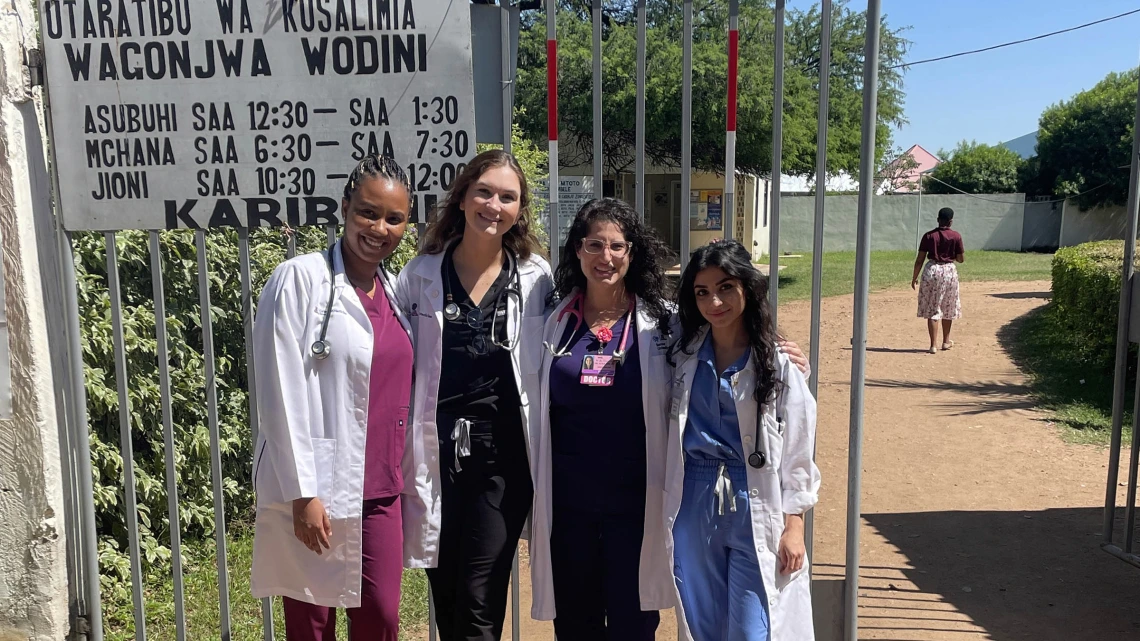
Sommer Aldulaimi, MD (second from right), with University of Arizona College of Medicine – Tucson students Jasmine Locke, Lacey Culpepper and Pantea Sazegar, collaborated with and provided training to assist in opening the hospital newborn unit at the Songambele Health Centre in Tanzania in May 2022.
Sommer Aldulaimi, MD, recalls her father preparing 5-foot-long sub sandwiches at the convenience store he owned then taking them to Tucson’s Santa Rita Park to feed homeless people every Thanksgiving. Her mother took her and her siblings to volunteer at soup kitchens.
“It was very important to them we gave back to the community that took us in when we settled here, first on the East Coast and later in Arizona,” said Dr. Aldulaimi. “My dad is from Iraq and my mom is from Iran. But growing up here – with my family being Middle Eastern in a non-English speaking household – gave me a different perspective of people, understanding of culture and being accepted. I definitely had a globalized view of the world.”
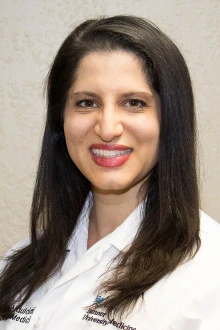
Sommer Aldulaimi, MD, is co-director of the College of Medicine – Tucson’s Global and Border Health Program and medical director of the Department of Family and Community Medicine’s refugee clinics for people relocated in Tucson.
That has driven Dr. Aldulaimi to a life of service through medicine. She’s done that almost entirely with the University of Arizona College of Medicine – Tucson.
Mentor inspires early desire to help globally
Dr. Aldulaimi credits Ron Pust, MD, professor emeritus in the Department of Family and Community Medicine, as sparking her wanderlust for serving the underserved worldwide. She said his tales of spending four years on the Navajo Nation and in Nigeria with the U.S. Centers for Disease Control and Prevention and six years as a general practitioner in Papua New Guinea inspired her.
Dr. Pust launched the college’s global health program as an intensive, interdisciplinary departmental course in 1982. When he retired in 2018, it had evolved into the college’s Global Health Distinction Track and larger Global and Border Health Program.
In January 2021, Dr. Aldulaimi joined Jerome Koleski, MD, also a family medicine faculty member, as program co-director. Five years earlier, the pair launched the department’s refugee clinics to address relocated people’s unique needs navigating the U.S. health care system. Today, about 20 students a year participate in the College of Medicine – Tucson’s Global and Border Health Program and Global Health Distinction Track.
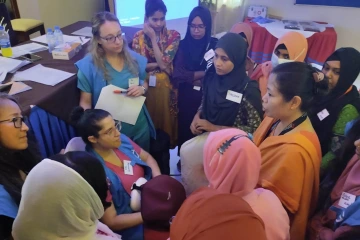
Dr. Aldulaimi (seated center) and fellow clinicians participate in an obstetrics basic life support training at a Rohingya refugee camp in Bangladesh in October 2022.
“The experience was incredible in every sense of the word,” she said. “The camp is massive. You don’t even recognize the scale until you actually see it. And one thing that struck me most is how variable resources are. A lot of nonprofits work in that camp. Doctors Without Borders has a couple clinics there that are really well staffed and funded. I’m always amazed at how much people do with so little.”
Dr. Aldulaimi’s international work interest started as an undergrad volunteering in Mexico with a 10-day Poverty and Public Health trip to Ímuris, Mexico, south of Nogales, through Alternative Spring Break. In summer 2008, after her first year as a medical student, she helped set up a clinic for the Health Ministry and nonprofit Salud Juntos in La Guacamaya, Honduras.
That same year, she took an exchange trip with Universidad de Sonora medical students to Hospital Cima Hermosillo in Sonora, Mexico, as part of the college’s Medical Spanish Program, and she did several Flying Samaritan clinical volunteer weekend trips to Baja California, Mexico.
Engaging local community aids success
Dr. Aldulaimi still volunteers in Mexico, including as clinical preceptor for MexZona Rocky Point Medical Clinics. She has been to Guatemala once and to Ecuador and Tanzania twice. Her first Tanzania trip in March 2020 ended prematurely due to the COVID-19 pandemic. She went back with three students for five weeks last summer to vet it as a site for future student and resident trips.
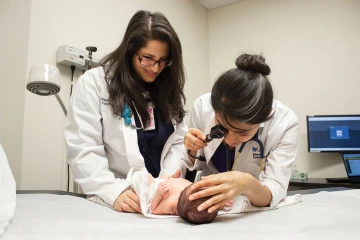
Dr. Aldulaimi (left) helps Andrea Christina Galaviz, MD, during her residency in 2019.
Dr. Koleski has a similar relationship for training volunteers in Kenya, where he just completed a sabbatical. In all, the Global Health program has taken trainees to more than 70 developing nations.
“Typically, we try to go somewhere we’re invited for a specific purpose because we want to make sure we’re partnering with the local community,” Dr. Aldulaimi said. “I'm letting the local people drive whatever we’re involved in.”
That comports with her and Dr. Koleski’s philosophy of taking students places where they learn from local clinicians, too.
Dr. Aldulaimi earned a bachelor’s degree in physiology and medical degree at the College of Medicine – Tucson. She did her internship and residency training in family medicine at Banner – University Medical Center South, her last year as chief resident. Along the way, she completed the Global Health Distinction Track and did rural residency rotations in Nogales, Bisbee, Safford, Tuba City, White River and Fort Defiance, Arizona. In 2014, she joined the Department of Family and Community Medicine faculty.
Today, she’s an associate professor, rural health director, refugee clinics medical director and Tucson Family Advocacy Program medical director, in addition to her role as co-director of the college’s Global Health programs. Nationally, she serves on related committees and working groups for the American Academy of Family Physicians and Society of Teachers of Family Medicine.
“I definitely had a globalized view of the world.”
Sommer Aldulaimi, MD
Dr. Aldulaimi chose family medicine to be a full-spectrum primary care specialist and often teaches overseas clinical staff workshops on obstetrics issues such as breech births, cesarean sections, postpartum hemorrhaging and helping babies breathe. She’s expecting her first child in May.
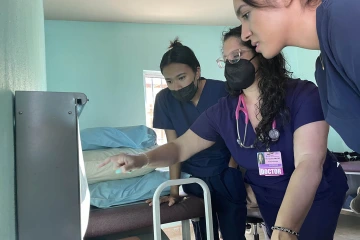
Dr. Aldulaimi (center) reviews an X-ray with students at the Rocky Point Medical Clinics in Sonoyta and Puerto Peñasco, Mexico, last summer.
She’s eager to take her child with her, though, if only to pass on that global perspective.
“My husband and I’ve been talking about it. I think it’ll be really good for our son to spend some summers in Africa and actually see what it looks like in other places. That’s something that’s really important to me,” Dr. Aldulaimi said.

